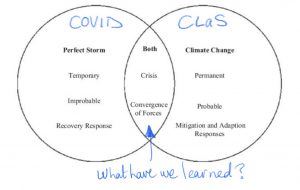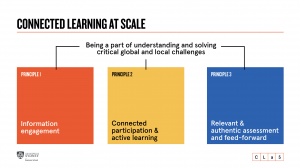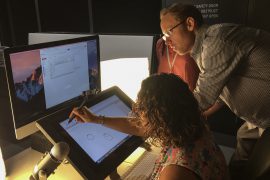I recently travelled to Antarctica as part of the largest contingent of women in STEMM to venture to the frozen continent. During my three weeks on the Homeward Bound leadership initiative amongst the icebergs and the wildlife I became intimately acquainted with the impacts of climate change and the (negative) flow on effects to our planet. Inspired by a recent article from Kay Bunch who uses the metaphors of a perfect storm and climate change (see diagram) to describe the current state of undergraduate business education, it became clear to me that COVID-19 is our perfect storm (temporary, improbable and requiring a quick recovery response), whilst ‘connected learning’ is akin to climate change (permanent, probable and requiring mitigation and adaptation responses). And what we need to do is look to the overlap for ways we can leverage this trying situation and build better teaching and learning experiences.

Reflecting on the last four months of work life during COVID-19, there are lessons learnt that we can integrate into our work on the Connected Learning at Scale project (CLaS). This educational design and development project is a strategic initiative of the University of Sydney Business School underpinning our 2025 strategy and funded by a Vice-Chancellor’s grant. The Business Co-Design (BCD) team had begun work in 2019 with our four B. Commerce core units which host our largest undergraduate cohorts (over 1000 students each) looking at ways in which we could design-in more connected learning experiences for our students and help overcome their feelings of isolation. This year we planned to start ideation and design on the new M. Commerce core and specialisation foundation units ready for implementation in semester 1, 2021. But then our world changed and as you know everyone’s focus turned to (supporting) the pivot online for remote teaching and learning.

There are positives that have come from the move online which was at the time very stressful for a great many people. The main one I have noticed is the growing number of conversations about teaching. Traditionally, teaching has been a solitary profession with teachers ‘owning’ their classroom space. Once the doors close the teacher takes the stage. I know the University has been championing a system of open-door classes which is fantastic, with lots of known benefits to sharing of practice. In many ways opening your online classroom is somewhat easier (less noticeable) and it can begin by showing and talking about what you do in that space. At the Business School we have run a series called ‘Learning through change @OurPlace2020’ supporting academic colleagues to capture some of the challenges and share with their peers, interesting and innovative approaches to teaching online. The recent University-wide COVID-19 symposium was another opportunity for sharing practice and our Business School L&T Forum later this year, yet another.
There are those amongst us who will continue to look for opportunities to share their teaching practice, but what COVID-19 has allowed for is the opportunity for our ‘everyday heroes’ to share, to ask questions, to observe how it is done by their peers. This perfect storm is a situation the majority of staff have never before found themselves in (that is, teaching fully online). They may have dabbled with the LMS, created an online quiz, or added their slides and recorded lectures into the virtual space for students to access. But COVID-19 times have enabled opportunities to look at the Canvas LMS through new eyes, to look for new possibilities for student learning. We have also had to think much more deeply about ensuring our students are connected. We all care that that many of them were isolated, lonely and struggling. Many of us were too. Offering opportunities to speak together online, to share opinions and thoughts on a concept or challenging theme has pushed us to look for tools and approaches to facilitate that, over and above Zoom.
All of this is positively encouraging when it comes to the Connected Learning at Scale project. This approach is a wide scale change – large classes may be our focus now, but the days of intimate small classes are numbered. The massification of higher education is well understood and better use of learning technologies and online spaces are here to stay. The literature has long foretold the end of the large lecture with numbers dwindling year on year. CLaS looks to find new ways of letting students connect to information (principle 1), taking a journey through content according to their needs and abilities, stretching and testing themselves. Moving to a student-centred classroom (principle 2) is another step towards asking teachers to let loose on their control and instead guide and facilitate active and collaborative learning, along with others. A team approach makes a lot of sense – each member of the team (lecturers, tutors, learning designers etc) brings their expertise and contributes to a part of the student experience. Creating online educational assets that combine a range of voices gives students a richer learning experience. In the CLaS project we have also encouraged student voices to be incorporated through alumni, student feedback, student generated media. Like them or loathe them, online exams have also given us pause to rethink our approaches to assessment and consider the authenticity, the necessity and the value (principle 3).

As semester 2 approaches, we still live in uncertain times. We are unsure of numbers, classroom formats, distancing regulations. However, the team teaching approach is growing in momentum with calls from some of our disciplines here in the Business School to open up Canvas sites as standard (not just for a few weeks), continue to learn from each other and provide the best learning experience we can for our students as we navigate the unchartered waters yet again. The storm is not so perfect this second time round.
Like fellow Homeward Bound Alumni, Christiana Figueres, I am a stubborn optimist and believe we as a collective (of humans) will come together and do the right thing with respect to our planet and our species. Much as I believe we as an institution will take forward the lessons we have learned from the global pandemic and create better, more connected experiences for our students in this brave new world.






4 Comments